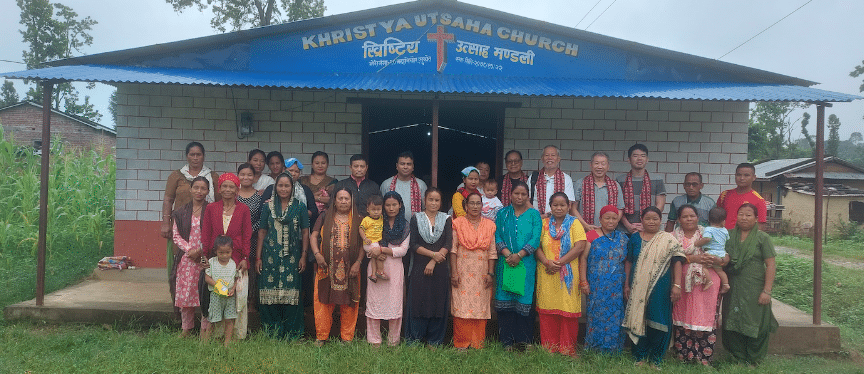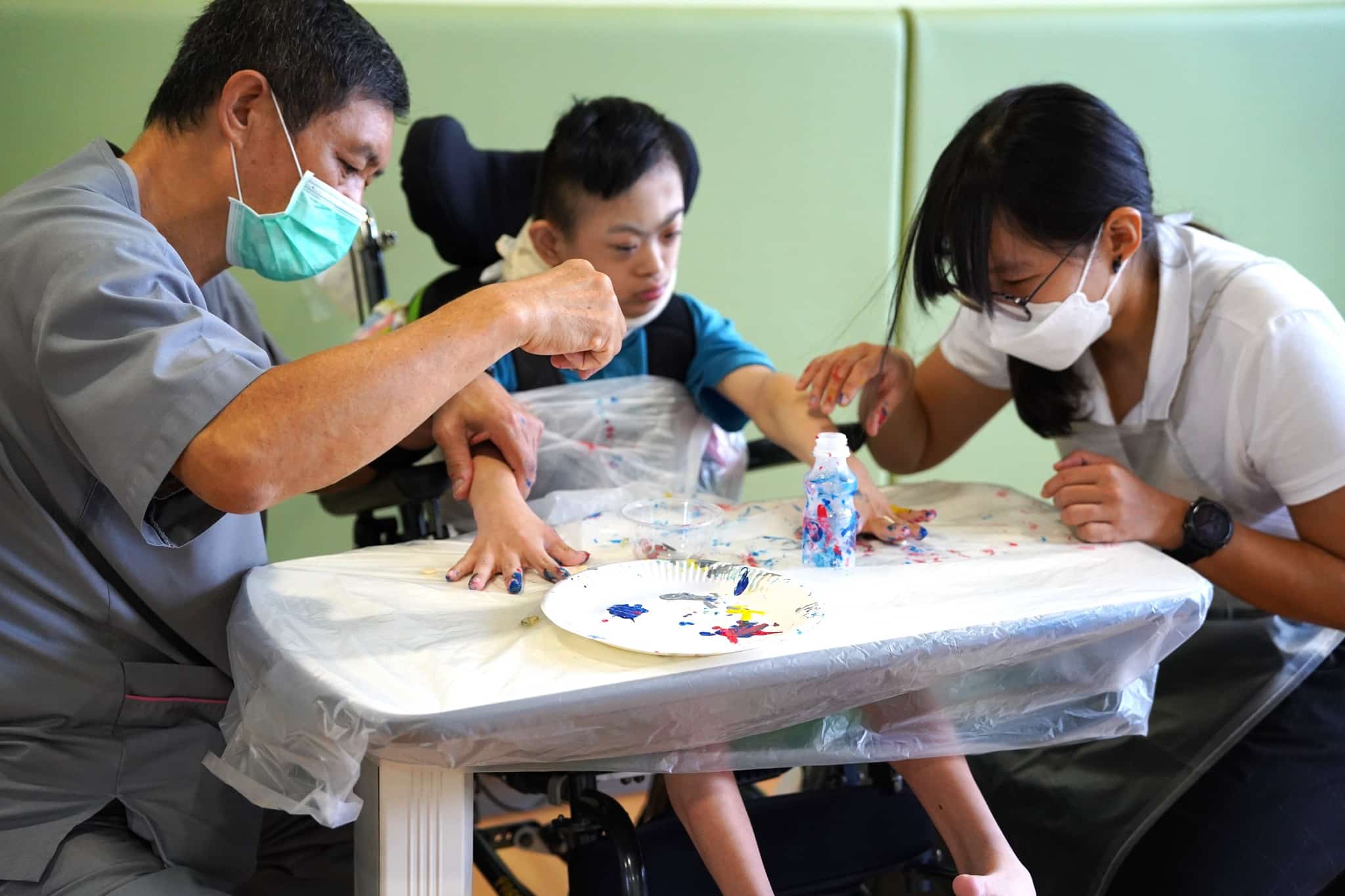Disturbed by “poverty porn” on crowdfunding sites? This team wants to restore dignity to beneficiaries
by Janice Tai // June 23, 2023, 4:57 pm
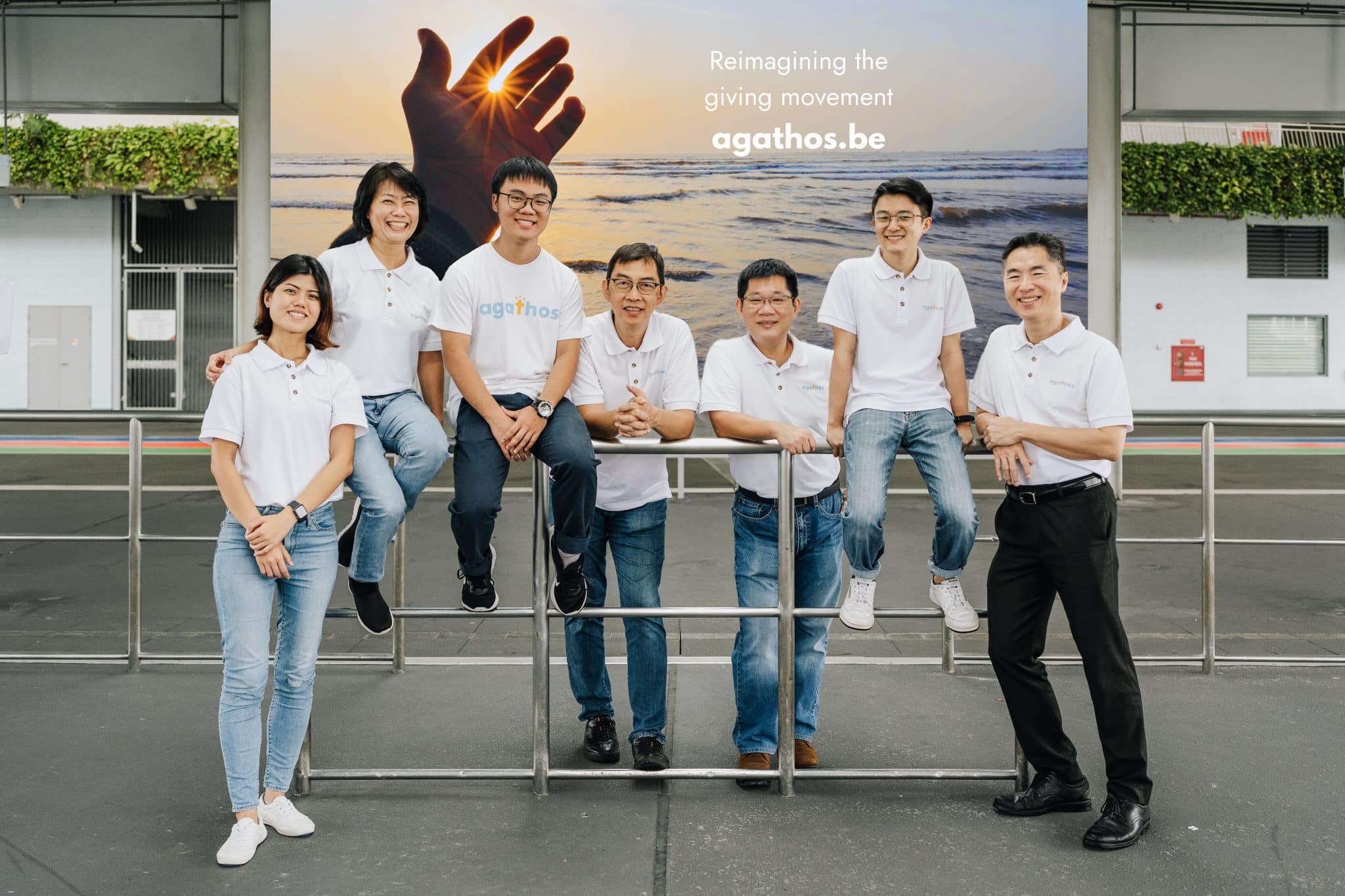
"We hope agathos can direct believers to give multi-dimensionally to support Kingdom-centric community projects that express the social Gospel and bring dignity to beneficiaries," says Daniel Long (extreme right), seen here with the Singapore-based team. All photos courtesy of agathos.
The Delta variant of the Covid-19 virus spread like wildfire throughout Vietnam in 2021. Hospitals were unable to cope with the surge in Covid cases, and with strict lockdown measures, patients were left stranded at home without medical help.
Singaporean Daniel Long, who helms Olive Tree Estates – a real estate developer which provides affordable housing and social services in developing countries such as Vietnam – knew his team had to do something about the situation.
“People or their plights were presented in undignified and dehumanised ways in order to raise donations.”
“There was a lot of death and suffering around us,” Daniel, 53, told Salt&Light.
His team quickly spread the word and managed to fundraise USD$50,000 within a short time to purchase oxygen concentrators.
They worked with local Vietnamese doctors and volunteers to loan these oxygen concentrators and provide medical services to Covid-19 patients who were recovering at home.
“Many lives were saved and suffering alleviated. We saw how effective and impactful crowdfunding could be,” he added.
Crowdfunding for social impact
Following the success of this initiative, his team considered coming up with their own crowdfunding platform so that they could invite other like-minded people to contribute to other social impact projects. Opening the platform up to the public could mean that other causes could receive support too.
Before developing the crowdfunding platform, they did research on existing platforms in order not to replicate what was already available.
“What we saw was quite disturbing. There was quite a bit of poverty porn where people or their plights were presented in undignified and dehumanised ways in order to raise donations,” said Daniel.
“Whenever Jesus met needs, He did it in ways that show grace and compassion. He sought to uplift instead of demean.”
Some appeals, for instance, included pictures of sick or dying children lying on hospital beds with tubes going in and out of them, with their parents beside them crying or begging for help. Other pictures highlighted deformed or wounded body parts to provoke disgust or horror.
“These are effective in tugging on the emotional heartstrings of donors but it also felt exploitative to present the beneficiaries in such a way. As it is, their loved ones are already in distress,” said Daniel.
As a believer, he pondered what Jesus would do in such a situation.
“Whenever Jesus met needs, He did it in ways that show grace and compassion. He sought to uplift instead of demean,” said Daniel.
Some instances in the Bible include Jesus’ encounter with the woman at the well, where he gently pointed out her sins over a series of questions instead of explicitly exposing her shameful deeds. When Jesus met those whom society disdained, such as Zacchaeus, the tax collector who hid in the tree, he honoured them by dining with them.
“Those who need help are also created in His image. If we would not post such pictures about our brothers or sisters, what gives us the right to post such pictures of, say, our migrant brothers?” said Daniel.
His team felt that, apart from visual presentation, the mode of contribution could also be improved.
“Monetary contribution helps immensely but it takes a lot more factors to have real social impact. We wanted our giving to be more holistic and the needs to go beyond financial donations,” said Daniel.
Agathos: The good that acts for the benefit of others
With these convictions, the team rounded up a group of techies who believed in the cause to start creating a unique crowdfunding site that aims to reimagine what good, impactful and dignified giving would look like.
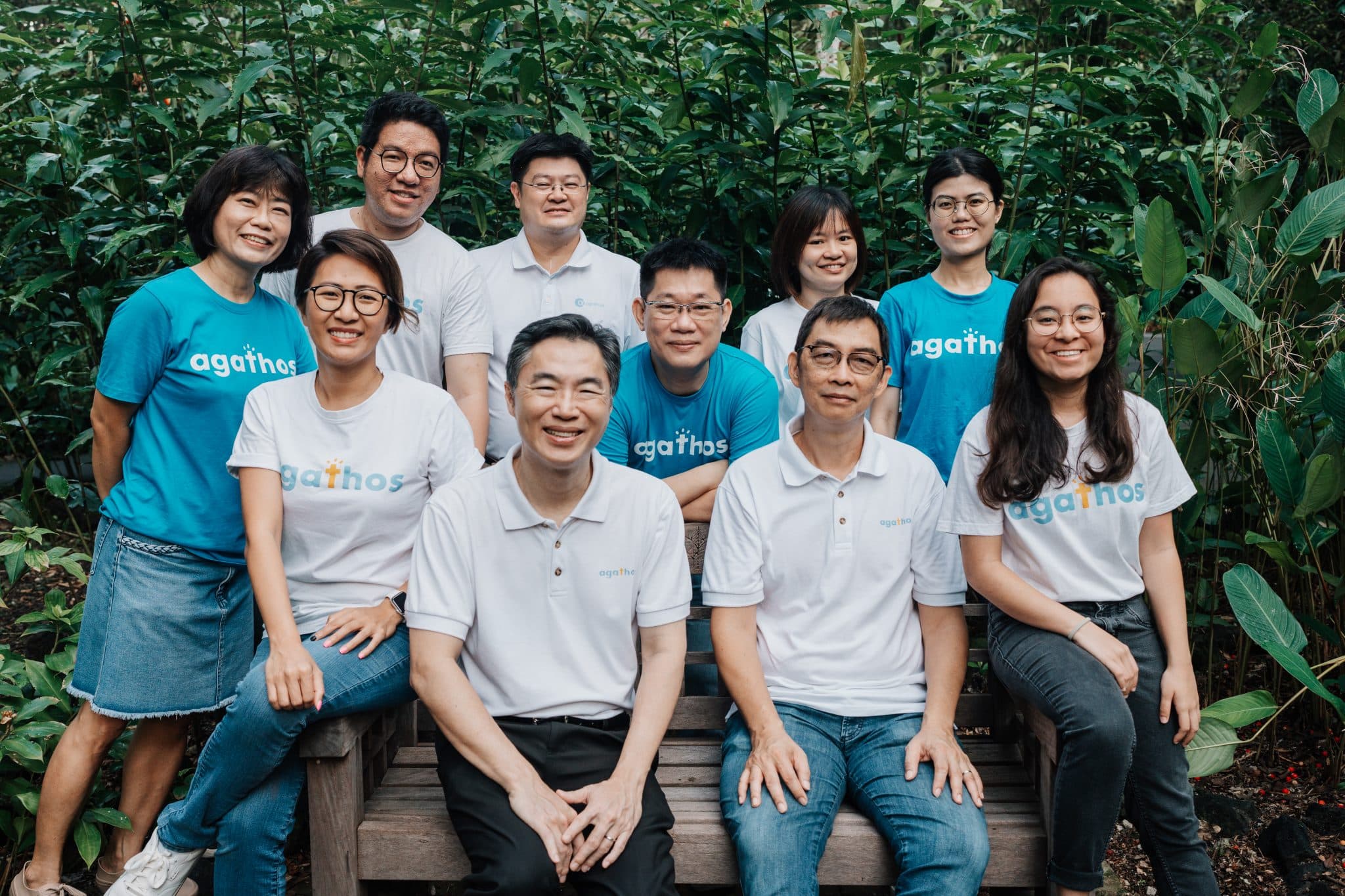
The agathos team: (Seated from left to right) Charlotte Teo (Brand and Marketing Consultant), Daniel Long (Principal Advocate), Terrance Tan (Principal Advocate), Bethany Low. (Standing from left to right) Pearlyn Tan, Nguyen Le, Lee Weeyan, Yen Juihung (CTO), Elaine Sia and Regina Loo (Project Lead).
The pilot version of the website was launched in November last year. It is called agathos, which means the “good that acts for the benefit of others” in Greek.
“Instead of giving quickly after seeing an emotionally-charged picture, perhaps donors can take time to understand and pray about the needs.”
One of its primary aims is to dignify donees by respectfully representing their needs and situation without exploiting their circumstances.
“This would involve taking time to understand the needs of the beneficiaries intimately, and then narrate or explain them clearly in story form instead of using video clips or pictures just to evoke pity, sympathy or horror,” said Daniel.
Pictures that are used should be curated for tastefulness and respectfulness, he added.
For example, a project on agathos invited donors to donate bottles of cooking oil to the Youth With A Mission (YWAM) centre in Geylang so as to bless migrant workers who need the staple for cooking.
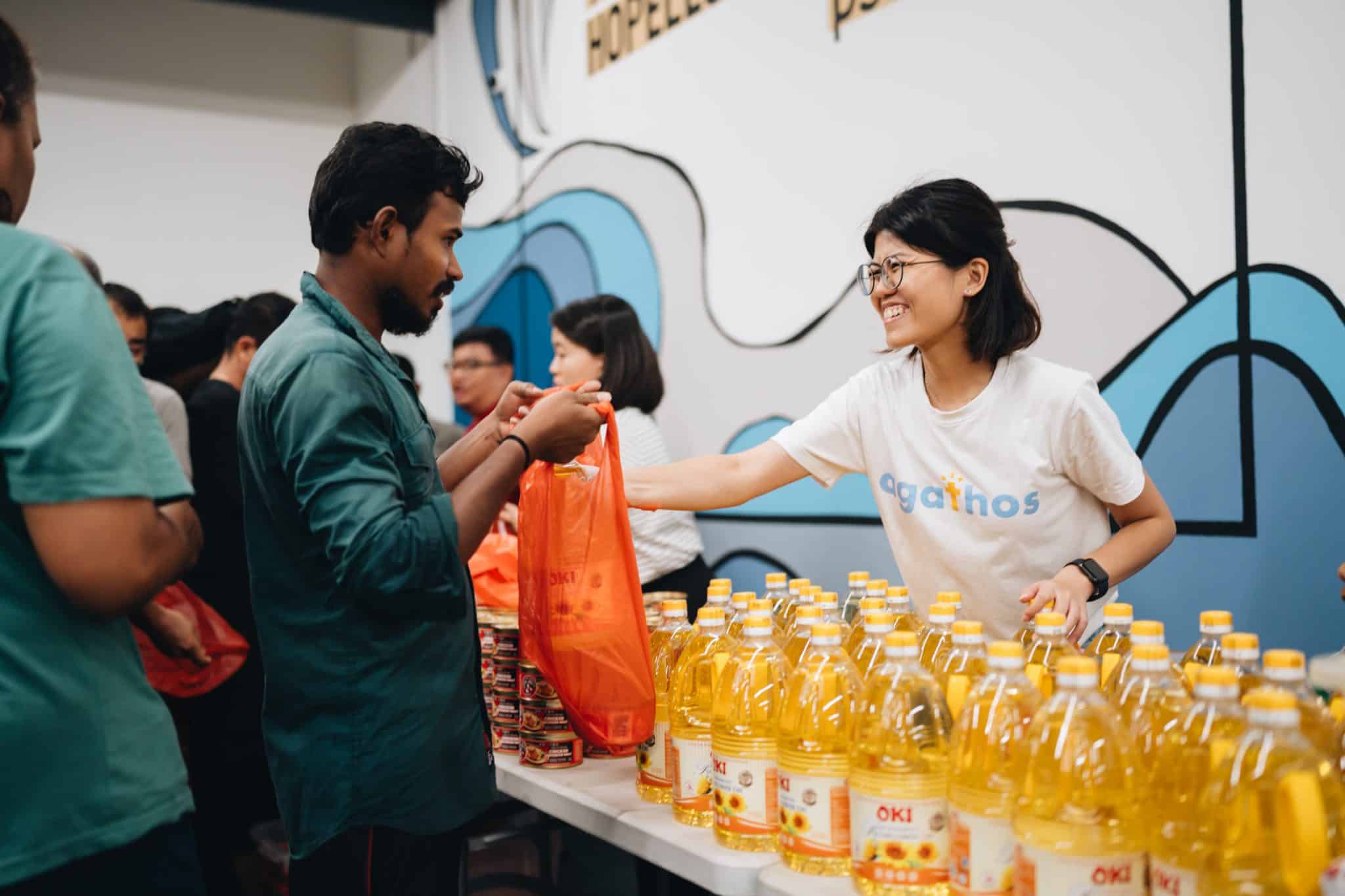
An agathos project that called for the donation of cooking oil to bless the migrant workers who have literally contributed to the building of Singapore.
Instead of using images that showed them rushing into its centre, desperate to take the oil, the appeal used pictures showing volunteers and migrant workers interacting warmly over the bottles of oil.
Reshaping how donors respond
Agathos’ other aim is to rewire the circuitry of donors.
“Instead of giving quickly after seeing an emotionally-charged video or picture, perhaps they could take time to read, understand and pray about the needs before deciding who to give to and how to go about it,” said Daniel.
“We need to do the right thing in God’s eyes if the ends don’t justify the means.”
However, he admitted that getting donors to take time and interest to understand more about the donees’ situation may be too lofty an ideal.
“If doing this means we get lacklustre donations or responses, it is something we are prepared to live with. We need to do the right thing in God’s eyes if the ends don’t justify the means,” he said.
Agathos also seeks to reshape the thinking of donors by offering multi-dimensional ways of giving beyond financial contributions. Donors could donate the required items in kind or offer a relevant skill that is needed.
The cooking oil distribution exercise saw a donor – Mewah Group – giving 100 two-litre bottles of oil to the migrant workers.
Another project hosted on its site – Café Kunyah, which hires a blind chef and an assistant with cerebral palsy – seeks not only monetary donations but skill sets such as marketing and branding, as well as software programming expertise.
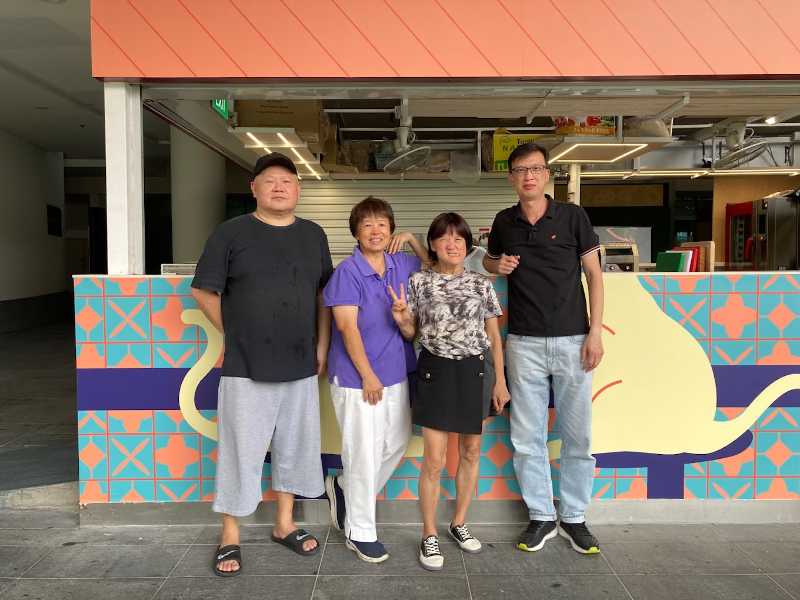
Kunyah Cafe is a culinary initiative by a social enterprise to empower people with disabilities and help them regain their self-worth by providing them with employment opportunities.
Donors can click the “Share Skill” button to find out what skills are needed and then enter the details of the specific skills they have.
The information is sent to the project representatives or beneficiaries for them to contact and liaise with the donors directly.
Supporting nimble ground-up projects
Agathos welcomes fundraising causes not only from registered charities, but also small, ground-up initiatives.
“From our experience in Vietnam, we find that ground-up fundraisers tend to be flexible and nimble, and able to work quickly to provide targeted relief and care in the moment of need. They serve those who have fallen through the cracks of the system and we want to support them,” said Daniel.
Undergraduate Joanne Chua, who has been to Turkey for a few months for humanitarian work, started a fundraising project on agathos after the country was hit by an earthquake earlier this year. The funds raised were sent to YWAM to help transport families out of the city and pay for other daily necessities.
In order to ensure that these ground-up projects are legitimate, the agathos team – comprising one full-time Chief Technology Officer and nine other passionate volunteers – has put in place rigorous due diligence checks. These include checks on whether the fundraiser is known and trusted in the community, as well as accountability checks on last-mile payments.
The team has sent two members to Indonesia, for instance, to find out how the Indonesian partners of a church in Singapore intend to use funds raised for an orphanage in Indonesia before deciding on whether or not the project will be hosted on agathos.
Accountability and transparency
Fundraisers are also encouraged to give donors regular updates on the projects, and to produce impact reports when the projects are completed.
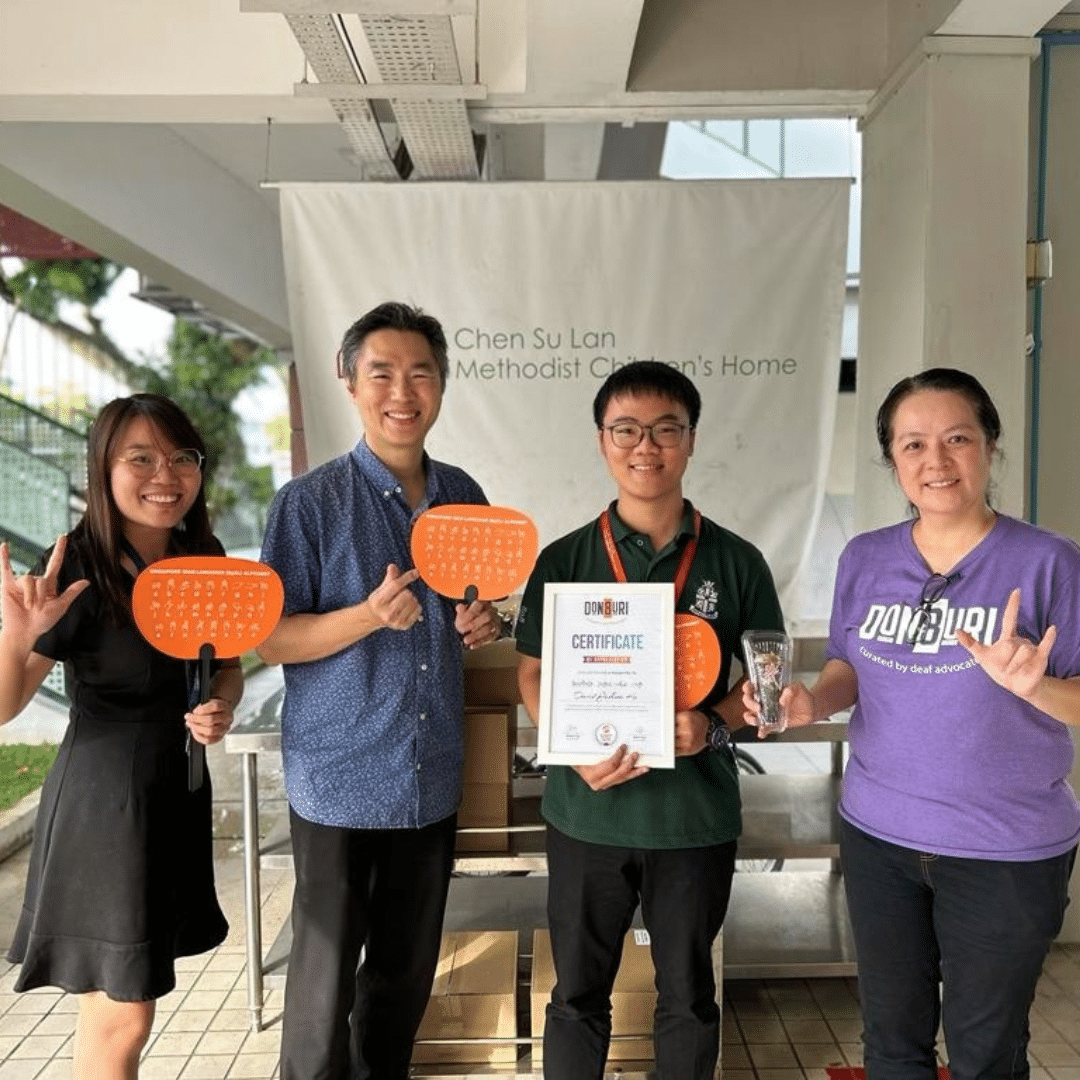
David Ho (in green) decided to raise funds to throw a special meal for the children in Chen Su Lan Methodist Children’s Home to celebrate the end of exams and the start of school holidays.
While he was waiting to be enlisted in National Service, student David Ho started a fundraising project on agathos to raise money for a Japanese-themed dinner for the residents of Chen Su Lan Methodist Children’s Home.
The children have worked hard in school and he wanted to celebrate with them the end of their first school term with a special meal. The project raised a total of $2,150.
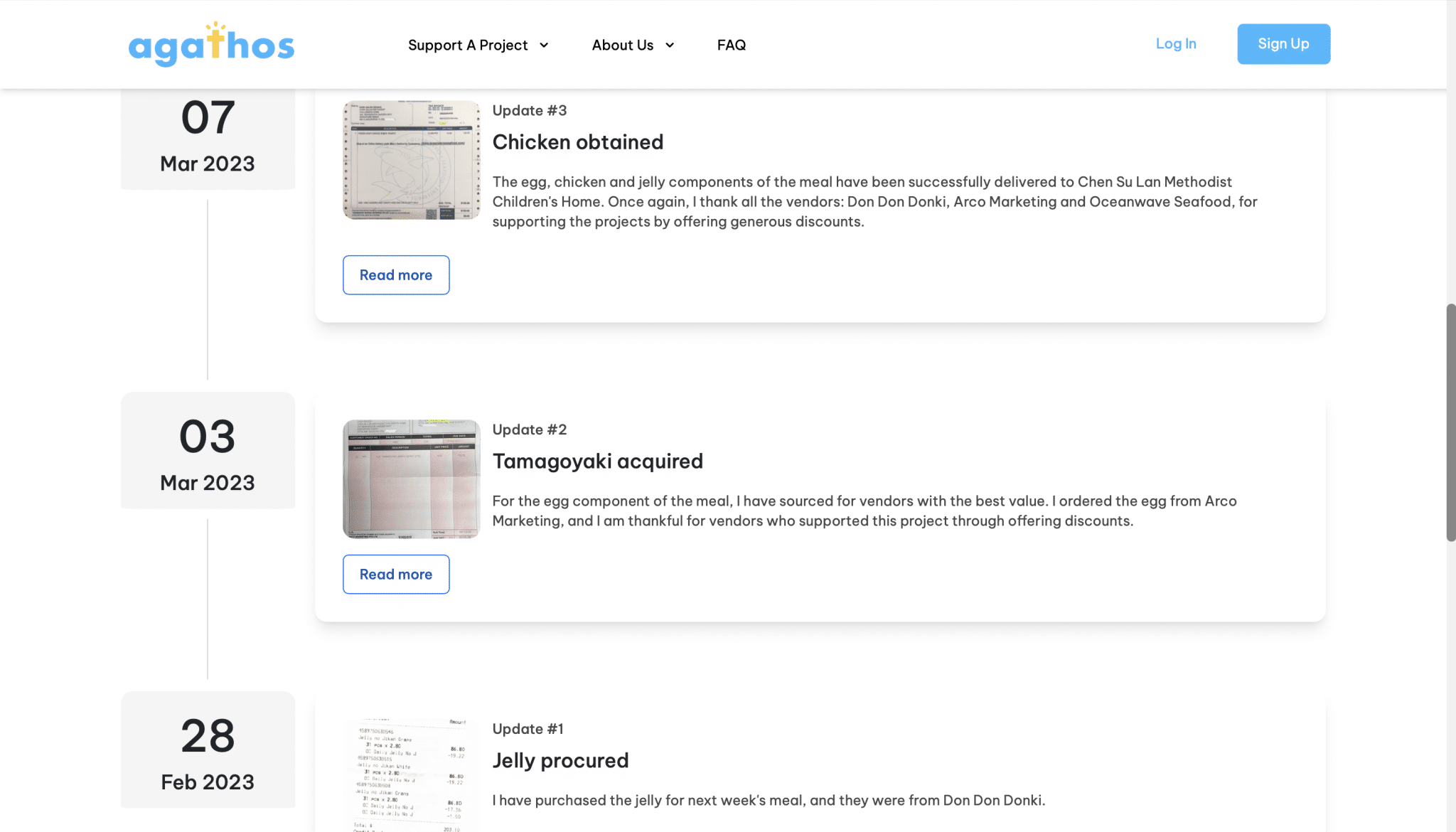
Donors are regularly updated about the progress of the project. In this case, updates were made whenever a food item was purchased.
To ensure accountability and transparency, he provided updates along the way of when and how he purchased the jelly, egg and chicken components of the meal. He also attached screenshots of receipts and the payment transfer made as he had donated the excess funds for the home’s grocery needs.
For the project in Vietnam where oxygen machines were purchased for Covid-19 patients, an impact report was produced for donors.
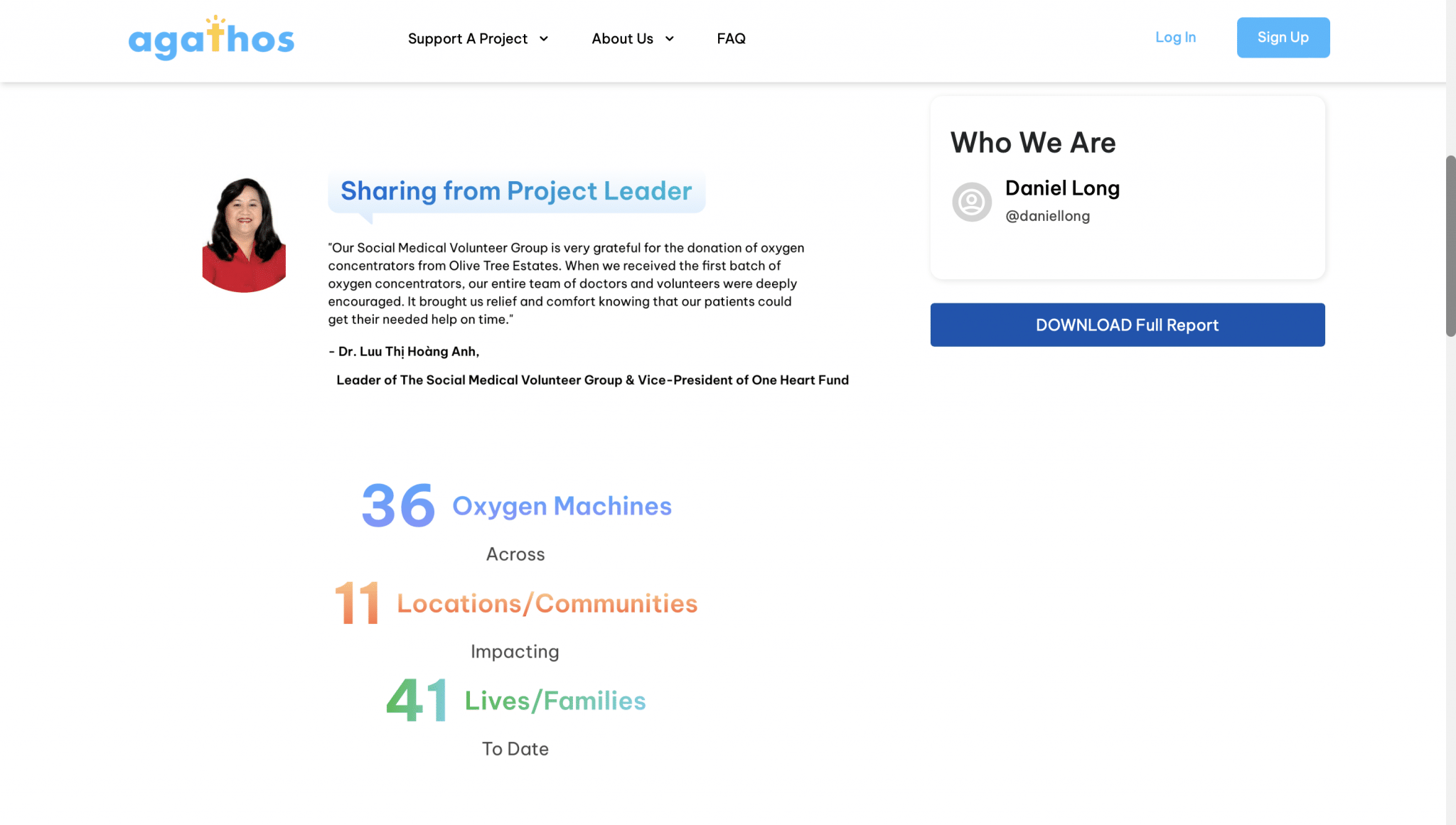
The impact report of a project that provided oxygen machines to Covid-19 patients.
The project leader shared that 36 oxygen machines were bought and distributed across 11 communities, impacting 41 lives and families.
Donors can donate the required items in kind or offer a relevant skill that is needed.
She also shared stories from the ground and detailed how the oxygen machines will continue to be used in future.
Agathos does not charge any platform fees, but its payment service providers take a fee of between 1 and 3% for their services. Agathos’ start-up capital was funded by family and friends, and it relies on the goodwill of its donors to tip when they donate on the platform.
In line with some major charities, such as UNICEF and the Salvation Army, the agathos platform also accepts cryptocurrency from donors.
Though it is founded on Christian values, agathos purposes to serve the needs of all nations and peoples, regardless of race, language of religion.
Projects that are hosted on agathos need not be hosted or owned by Christians, and all donors are welcome.
A platform to channel Christian giving
Initially, agathos did not present itself to be faith-based. Now, however, its logo includes the Cross and its landing page displays their key verse – Matthew 25:40 – prominently.
“If we put God at the centre, how would that shape our giving?”
Jesus’ command in the verse that “whatever you did for one of the least of these brothers and sisters of mine, you did for me” is central to the enterprise’s giving ethos.
“Jesus calls us to serve everyone as an expression of the social Gospel. However, we also pivoted to be more overtly faith-based because many believers, including Eugene Seow and Joseph Chean, have encouraged us to use this platform to channel Christian giving and to mobilise believers to centre God in their giving. We believe God was leading us to do so and we obeyed,” said Daniel.
Both Eugene Seow, a veteran social service practitioner and board member to several social agencies, and Joseph Chean, former National Director of YWAM Singapore and the current Strategic Coordinator of Antioch 21, sit on the advisory board of agathos. Both of them have an extensive track record in the social services and missions scene.
“There is quite a bit of proxy giving in the Church where we give our tithes and stop there. It is much easier to give money than to volunteer at an orphanage. But if we put God at the centre, how would that shape our giving?” said Daniel.
He pointed to the context of the verses preceding Matthew 25:40 that speak of how the servants managed their master’s wealth.
“We are all given a myriad of gifts and talents and they need to be stewarded wisely to serve those in need in many different ways beyond just the giving of money,” said Daniel.
Using AI to match resources and needs
Going forward, the agathos team hopes to release another version of the site that utilises Artificial Intelligence to match donors’ contributions to the needs of donees ‘live’ at any one moment in time.
This would prevent unnecessary wastage of items or perishables that could also clutter up the storehouses of aid organisations, causing logistical inconveniences and inefficiency.
So far, about eight projects championing a variety of causes from mental health to food security have been hosted on agathos.
It has over 100 users and has raised approximately $15,000. The team hopes that more people will come to know of the crowdfunding site and use it.
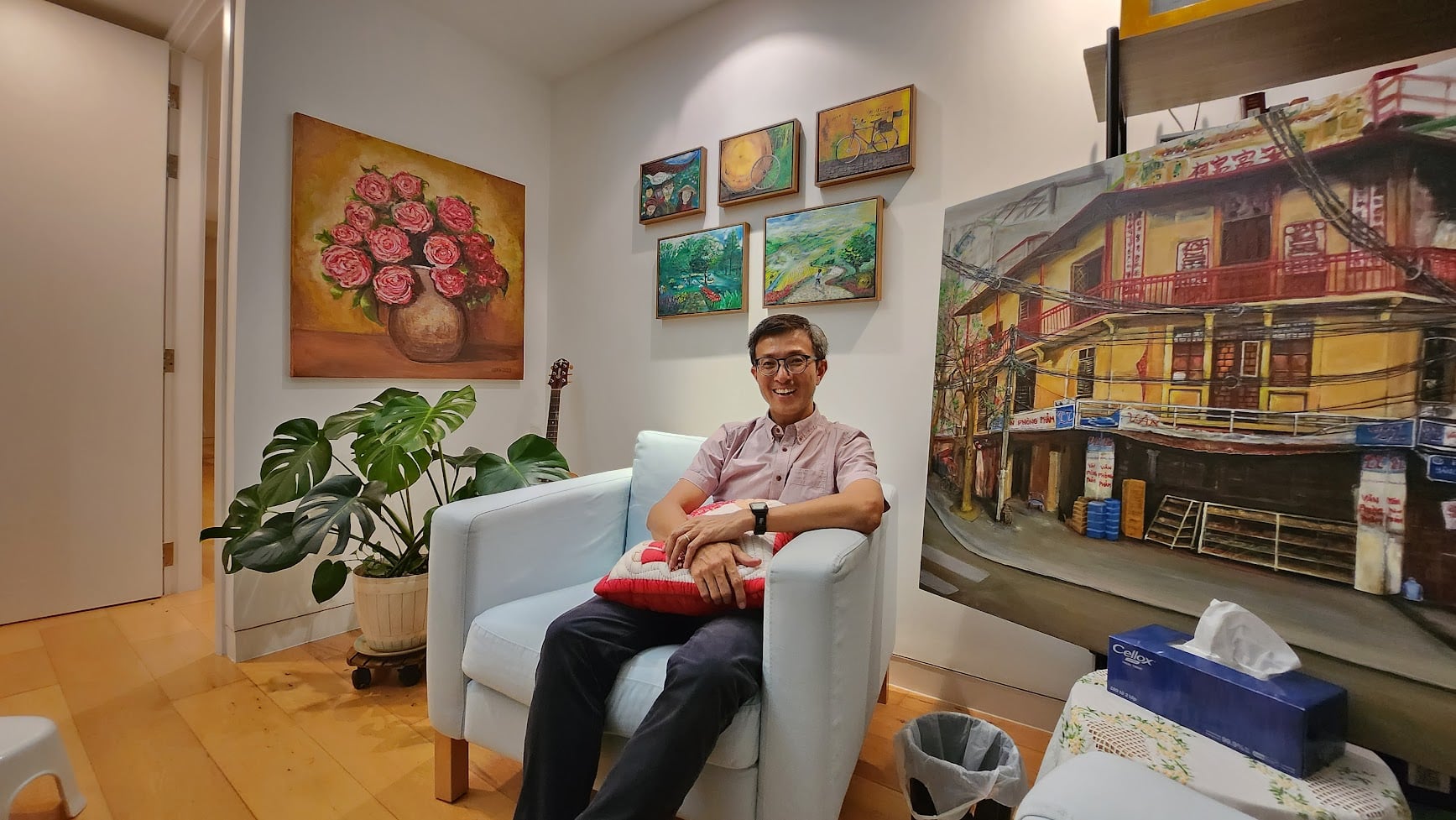
Agathos is hosting a project to support Michael Ong, a Singaporean social worker who provides pro-bono counselling in Hanoi, Vietnam to youth in crisis. He paints and gifts each young person a painting to commemorate their journey.
Said Daniel: “We hope this can direct believers to give multi-dimensionally to support Kingdom-centric community projects that express the social Gospel and bring dignity to beneficiaries.”
RELATED STORIES:
This is how we love and serve: Habitat for Humanity’s BlockWalk cleans up our neighbourhoods
We are an independent, non-profit organisation that relies on the generosity of our readers, such as yourself, to continue serving the kingdom. Every dollar donated goes directly back into our editorial coverage.
Would you consider partnering with us in our kingdom work by supporting us financially, either as a one-off donation, or a recurring pledge?
Support Salt&Light